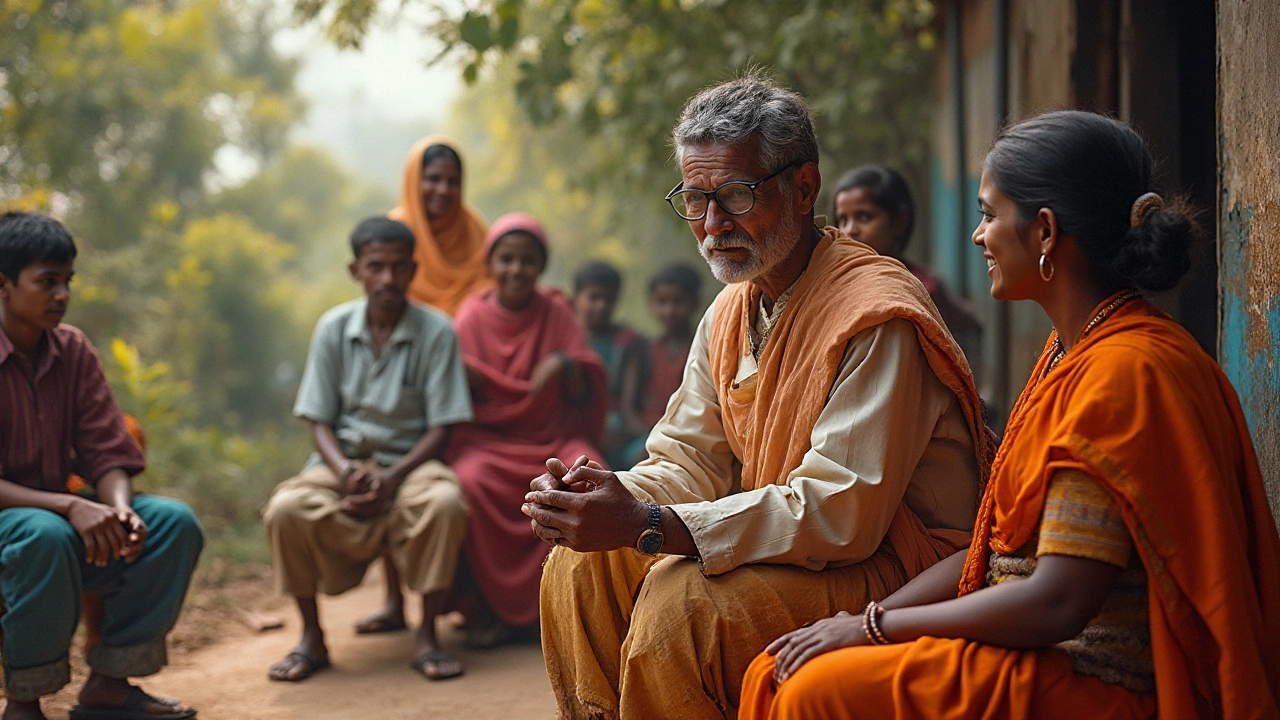
- Created by: Lydia Carmichael
- Completed on: 2 Feb 2025
- Categories: Volunteering
Volunteering is more than just giving time; it’s about making a meaningful impact on lives and communities. At the heart of this endeavor lies a simple yet profound principle: the golden rule—treat others as you wish to be treated. This age-old adage becomes even more powerful in the context of service work, serving as a compass for creating positive change.
Understanding and embracing this rule in volunteer efforts can transform the way we connect and contribute. It involves stepping into others’ shoes, appreciating their circumstances, and showing genuine care. The golden rule invites us to approach volunteering with a spirit of empathy and kindness, qualities that nurture trust and cooperation.
Whether working at a local soup kitchen or participating in international aid, aligning your actions with this principle ensures that help is given with dignity and respect. Selecting the right opportunities is crucial—ones that resonate with your values and skills can enhance your experience and the impact you have. Grounded in the golden rule, these acts of kindness build stronger communities and create ripples of change that reach far beyond the initial act.
- Understanding the Golden Rule in Volunteering
- The Importance of Empathy and Respect
- Finding the Right Volunteer Opportunity
- Maximizing Impact in Volunteer Work
- Challenges and Rewards of Following the Golden Rule
Understanding the Golden Rule in Volunteering
The golden rule is a universal principle that transcends cultural and temporal boundaries, urging individuals to treat others with the same respect and kindness they desire for themselves. When it comes to volunteering, this rule takes on an added layer of significance, transforming service from a mere act of charity to an exchange of humanity and common decency. To fully grasp the intricacies of this rule in the context of volunteer work, it's crucial to consider its roots and how it manifests in various forms of community service.
One way to think about the golden rule is as a guide to fostering mutual respect and understanding. It challenges volunteers to shift their perspective from seeing service as a one-way street to recognizing the reciprocal benefits that both the giver and receiver can experience. This change in mindset not only enhances the quality of community support but also amplifies the impact of volunteer efforts. When volunteers approach their work with a sensitivity to the needs and wishes of those they serve, the experience becomes enriching for everyone involved. The golden rule encourages individuals to actively listen and engage, building genuine connections that leave a lasting imprint.
Empathy plays a crucial role in this process, as reflected in an old adage taught in ethics courses: "Walk a mile in someone else's shoes."
As former U.S. President John F. Kennedy once said, "If we cannot end now our differences, at least we can help make the world safe for diversity." By applying this principle in volunteer contexts, individuals cultivate a deeper understanding of the challenges and joys faced by others, fostering a more compassionate world. Furthermore, this empathetic approach allows volunteers to tailor their efforts to meet the unique needs of each situation, whether it involves disaster relief, educational support, or environmental conservation.
Interestingly, studies have shown that communities with strong volunteering participation rates tend to have better social cohesion and reduced crime rates. A survey by the Corporation for National and Community Service revealed that people who volunteer regularly are more likely to report health benefits, ranging from lower stress levels to improved physical health. This data underscores the symbiotic relationship between volunteers and the communities they serve, illustrating how the golden rule doesn't just enrich personal experience but contributes positively to the broader community fabric.
The Importance of Empathy and Respect
Volunteering, at its core, revolves around human connections, and at the heart of these connections is the profound power of empathy and respect. Volunteering often places individuals in unfamiliar settings, working alongside communities that may differ in culture, language, or life experiences. Here, empathy—the ability to deeply understand others' emotions and circumstances—and respect—acknowledging the inherent dignity in every person—are indispensable. These qualities guide us in relating genuinely and effectively to those we seek to assist, transcending mere charity to forge meaningful and trusting relationships.
Empathy encourages a volunteer to listen actively and approach situations without prejudice, paving the way for genuine understanding. It involves stepping beyond our own experiences and tuning into the realities faced by others, which often requires patience and open-mindedness. This deeper connection fosters a more authentic way of helping, one that aligns with the actual needs of the community rather than preconceived notions of aid. Respect, on the other hand, asserts the importance of acknowledging the agency and strength of those we serve, treating them as equal partners in efforts toward positive change.
In the realm of community support, applying these qualities can lead to more effective and sustainable outcomes. Consider instances where volunteer initiatives have flourished, largely due to an empathic approach—a volunteer at a local food bank takes the time to learn names and listen to personal stories, cultivating an environment of trust and openness. Or a medical volunteer in disaster-stricken areas prioritizes understanding cultural nuances and traditions before implementing health practices; these are the scenarios where empathy and respect redefine assistance into empowerment.
"Empathy is about finding echoes of another person in yourself," quotes Mohsin Hamid. This sentiment finds resonance in volunteering where our abilities to empathize catalyze the strength of shared human experience. It's a reminder that, despite our diverse walks of life, our core needs and emotions bind us together in a shared journey.
The significance of these qualities is not confined to emotional satisfaction alone; it has tangible impacts. Projects designed and implemented with a respectful acknowledgment of community input are more likely to succeed and endure. This is underscored by numerous studies suggesting that volunteer efforts that incorporate local voices and wisdom result in increased acceptance and engagement. For instance, a UNESCO study highlighted that educational programs tailored in partnership with local communities saw participation rates soar by 40%, demonstrating the practical value of respect-informed strategies.
Adopting empathy and respect in volunteer service does more than enhance the experiences of those we help—it enriches our own lives too. The personal growth that volunteers undergo is profound, characterized by a broadened world view and heightened emotional intelligence. It educates and humbles, shaping individuals into more aware and considerate members of society. These intrinsic rewards return to our own communities, as volunteers often carry these enriched perspectives into their everyday lives, encouraging a culture of kindness and consideration. Indeed, by embodying empathy and respect, both volunteering and our broader social interactions become a shared pathway to mutual growth and understanding.

Finding the Right Volunteer Opportunity
Embarking on a search for the ideal volunteering opportunity can seem like an overwhelming task, especially with the myriad options available. But fear not; choosing the right path is all about aligning your passion with purpose. Begin by assessing what causes resonate most deeply with you. Are you drawn to environmental conservation, education, healthcare, or perhaps animal welfare? Narrowing down your interests provides a solid foundation for your volunteer journey. After all, when you are passionate about a cause, your commitment shines through, making a lasting impact.
Once you have pinpointed your interests, consider the skills you bring to the table. Every individual possesses unique talents that can be immensely valuable in a volunteering context. Are you an excellent organizer, a compassionate listener, or a skilled technician? Leverage these strengths to choose roles where you can contribute effectively. For instance, if you have a knack for teaching, volunteering at educational centers or tutoring programs might be fulfilling. A strategic assessment of your skills and interests can guide you toward opportunities where you can truly excel and grow.
Time commitment is another crucial factor when selecting volunteer opportunities. Some roles require long-term dedication, while others might be project-based or need only a few hours a week. It’s essential to match opportunities not only with your schedule but with the level of involvement you can realistically maintain. Balancing personal, professional, and volunteer responsibilities is vital to ensure a rewarding experience for both you and those you aim to help.
Exploring local community centers, online platforms, and volunteer matching services can open up a world of possibilities. Websites like VolunteerMatch and Idealist offer databases of opportunities spanning various causes and locations. These platforms allow you to filter options according to your interests, skills, and availability. Moreover, don't underestimate the power of networking. Community boards and social media groups often share opportunities that might not be listed on mainstream platforms.
Being open to new experiences and willing to step out of your comfort zone can sometimes lead to unexpected yet rewarding roles. For instance, one might initially aim to support educational programs but end up finding joy and fulfillment in organizing community arts events. Remain flexible and open-minded; volunteering is as much about learning and growth as it is about offering help. As Dalai Lama once wisely noted,
“Our prime purpose in this life is to help others. And if you can't help them, at least don't hurt them.”His words remind us of the profound impact we can have when we choose our volunteer paths wisely and thoughtfully.
Lastly, always invest time in researching potential organizations. Understand their mission, ethos, and the kind of support they seek. Doing due diligence ensures that you align with groups whose values match your own, creating a harmonious and impactful volunteering experience. As you embark on finding your perfect volunteer opportunity, remember that the journey is as valuable as the destination. Each step taken in the right direction brings you closer to making a tangible difference in the world around you.
Maximizing Impact in Volunteer Work
When individuals step into the realm of volunteering, they carry the potential to change not just the lives of others, but their own. To truly maximize impact, it begins with understanding the core needs of the community or cause you are engaging with. This requires thorough research and ongoing communication with those at the grassroots level. Volunteer work thrives on building relationships and bridges between various groups. Engaging directly with the communities fosters a deep understanding and paves the way for more effective solutions. Listening to what is needed, rather than assuming, often leads to more sustainable and impactful results.
Additionally, aligning personal skills with the needs of the community can significantly enhance how a volunteer's contributions are received. For instance, someone skilled in IT might be able to offer digital literacy training, which can be an incredibly valuable asset in today’s tech-driven world. Matching skills with needs creates a win-win scenario for everyone involved. Investing time in training before stepping into any volunteer role can ensure readiness and effectiveness, fostering confidence within both the volunteer and the community. As such, training is not just about acquiring new skills, but also about enhancing existing ones to suit new environments and challenges.
Equally important is the ability to adapt and remain flexible. The dynamics within any project can change due to various unforeseen challenges, such as sudden shifts in community needs or external pressures like funding constraints or unexpected social circumstances. Maintaining a flexible approach allows for adjustments and innovations that can lead to creative solutions and successful outcomes. With adaptability comes resilience, which is crucial for sustaining efforts and achieving long-term goals. This flexibility also emphasizes the importance of revisiting goals and strategies continuously.
"Volunteers don’t necessarily have the time; they just have the heart." - Elizabeth Andrew
Community collaboration and partnerships can greatly amplify the reach and depth of volunteering efforts. By forming alliances with local organizations and stakeholders, volunteers can leverage existing structures and resources, avoiding duplication of efforts and optimizing the delivery of service. This collaborative approach often results in a more holistic understanding of the issues at hand and facilitates comprehensive solutions. Engaging with multiple entities also fosters a sense of shared mission and responsibility, driving collective action and amplifying impact.
Tracking and measuring the impact of volunteering actions through consistent evaluation and feedback is essential. By using metrics to assess progress, volunteers can identify what is working well and what might need adjustment. This can involve soliciting feedback from community members or using data to guide decision-making processes. Monitoring impact not only helps improve the quality of service but also motivates volunteers by showcasing tangible results. Sharing success stories with the larger community can inspire others and recruit new volunteers to the cause.

Challenges and Rewards of Following the Golden Rule
Embracing the golden rule in volunteering presents both significant challenges and rewarding experiences. Adhering to this principle, which requires treating others as you would want to be treated, can be demanding. One of the main challenges is overcoming personal biases. Often, volunteers come from different backgrounds than those they are helping, which can create a barrier of understanding. Efforts to break down these walls require patience, active listening, and openness – qualities not always easy to embody under pressure. Volunteering can sometimes place individuals in uncomfortable situations, but these are powerful opportunities for personal growth.
Resilience is necessary when volunteering, especially when facing situations that test your preconceptions or when the results of your efforts are not immediately tangible. There might be moments of discouragement, yet maintaining the golden rule as a guiding light can help sustain motivation and compassion. This approach fosters a supportive environment, encouraging both the volunteer and the community to collaboratively tackle challenges without judgment. A practical example of this can be seen in organizations where teams must navigate cultural differences to implement sustainable solutions. The ability to see past stereotypes and act with genuine kindness makes all the difference.
On the other hand, the rewards of following the golden rule are profound. Integrating this principle enhances the positive impact of your service. By fostering a caring attitude, you build sustainable and meaningful connections with the community. These relationships often outlast the time committed to any individual project. The golden rule also creates a cycle of positivity: as volunteers show genuine respect and empathy, these values tend to become infectious, spreading among team members and beneficiaries alike. Such an environment not only improves morale but also enhances the effectiveness of volunteer opportunities by creating a culture of trust and cooperation.
To illustrate, consider a study that highlights how empathy-driven volunteer programs contribute to psychological well-being and social cohesion. Volunteers often report a sense of fulfillment and joy that comes from knowing they have made a difference, no matter how small. “Volunteering is at the very core of being a human,” said UN Secretary-General Ban Ki-moon, emphasizing the intrinsic satisfaction and enrichment that comes from serving others. This inner joy spurred by genuine altruism can be its own reward, often leading volunteers to forge commitments that evolve over time, enhancing their personal and professional lives.
Encountering these challenges and reaping these rewards typically leads to a greater understanding of oneself and the world. By practicing the golden rule, volunteers gain invaluable skills such as empathy, patience, and effective communication. These skills are not just essential for successful volunteering but are also transferable to many personal and professional settings. The ability to empathize deeply is a bridge to meaningful interactions and understanding – something the world can always use more of.